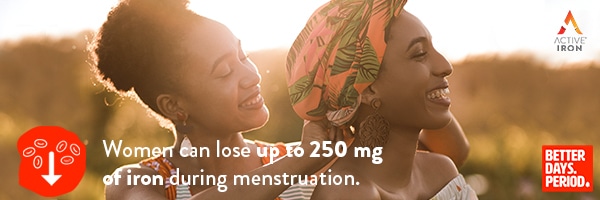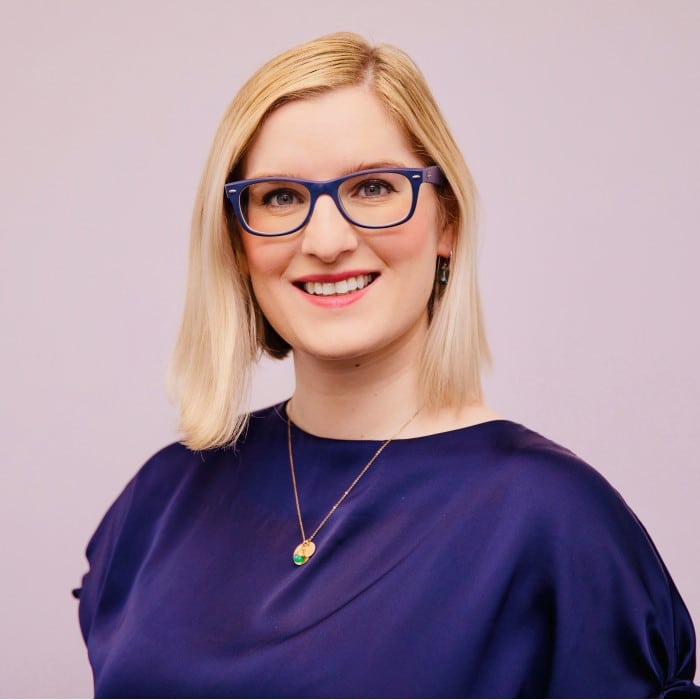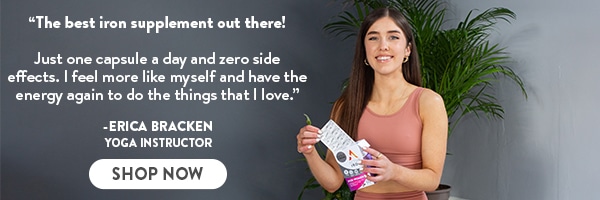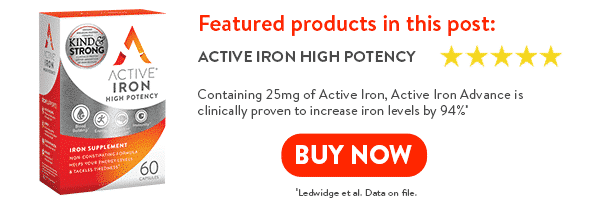HEAVY PERIODS AND IRON SUPPLEMENTS.

Menstruation is the leading cause of iron loss worldwide, with women requiring up to two times more iron than men. Having heavy periods may increase a person’s need for iron. It can be difficult to get sufficient iron from your diet, and in this case supplementation with iron may be required.
In this article on heavy periods and iron supplements, we’ll cover the following key topics and frequently asked questions:

What causes heavy periods?
Women experiencing heavy periods is very common. A recent survey conducted by Active Iron¹ showed that 67% of women experience heavy periods at least once, with 51% experiencing them most of the time, or every cycle. 51% also said that their periods have gotten heavier over time. This can often be the case when a person starts their period for the first time, after pregnancy, and during perimenopause.
There are a number of causes, some of which may include:
- Polycystic Ovary Syndrome
- Fibroids
- Endometriosis
- Pelvic Inflammatory Disease
- Certain medicines and treatments
- Stress and mental health disorders
How much iron is lost during menstruation
The average menstrual period can last anywhere from two to five days. During this time, it is estimated that 220 to 250mg of iron per pint of blood is lost. It is recommended that women of childbearing age (between 19-50), get 14.8mg of iron a day. Among women who experience heavier periods, adequate daily iron intake is particularly important and may be difficult to achieve with diet alone.

Heavy periods and your health
Iron is essential to life. It contributes to the reduction of tiredness and fatigue. It plays an important role in normal energy metabolism, oxygen transport, cognitive function, immune function, and formation of red blood cells and hemoglobin.
Menstruation is the leading cause of iron loss worldwide. Those with heavy periods are particularly at risk of developing low iron levels, which can often lead to ongoing tiredness and fatigue.
Other symptoms may include pale skin, headaches, and cold hands & feet. It is estimated that one in four women have low iron levels,² requiring up to two times more iron than men.
When to see a doctor about heavy periods?
If your heavy periods are affecting your life and wellbeing, it is recommended that you seek medical advice from your healthcare professional or doctor.
You also may want to seek medical advice if you experience any of the following:
- Severe pain during your periods
- Bleeding between periods or after sex
- Pain when peeing, defecating, or having sex
Manage heavy periods by taking an iron supplement
Blood loss leads to iron loss which in turn can lead to low iron levels. It can be difficult to get sufficient iron from your diet alone, especially if your iron needs are greater due to heavier periods. Those on restricted diets, such as vegetarians, may also find that they are not absorbing enough of the right kind of iron. There are two types of iron: heme and non-heme. Heme iron is the easiest for our bodies to absorb, and is found in animal sources, such as red meat, offal, poultry, and fish.
If you are not able to get sufficient iron from your diet, we recommend taking an iron supplement such as Active Iron. Active Iron High Potency contains a higher dose of iron at 25mg and is clinically proven to increase iron and resulting energy levels.³ Unlike most iron supplements, its groundbreaking formula is clinically proven to be gentle on the stomach – helping to avoid the common side effects of iron, such as nausea and constipation.³
Improve iron absorption during menstruation
There are many factors which affect a person’s ability to absorb iron. This can include diet, lifestyle, and the form of iron in their supplement: As mentioned above, those who get most of their iron from plant sources may have difficulty absorbing iron. This is due to the fact that plant-based iron is not as well absorbed as the iron we get from meat.
There are also a number of foods that can affect your iron absorption. Some examples of these include tea and coffee, and phytates found in wholegrains and legumes.
Those with absorption issues such as celiacs may struggle to absorb the iron from their food. This is because of damage to the gut lining caused by eating gluten. Active Iron is free from gluten and therefore suitable for celiacs.
Typically just 10% of the iron in high dose iron (or prescription iron) is absorbed, resulting in oxidation in the gut. It is this oxidation and poor absorption that causes gastrointestinal side effects such as nausea and constipation in 8/10 people.⁴ Typically, 50% of people stop taking iron as a result of these side effects.⁵
Active Iron’s unique formulation helps avoid the common side effects of iron, while efficiently increasing iron levels at the same time.
In order to maximize the absorption from iron, the best time to take iron is when your stomach is empty. This can be first thing in the morning, before you go to bed, or 1-2 hours after a meal.
Heavy periods and iron supplements: Conclusion
Menstruation is the leading cause of iron loss worldwide. Women with heavy periods may be particularly at risk of developing low iron levels, often leading to tiredness and fatigue.
Among women who experience heavier periods, adequate daily iron intake is particularly important and may be difficult to achieve with diet alone. If you are not able to get sufficient iron from your diet, we recommend taking an iron supplement such as Active Iron. Active Iron High Potency is clinically proven to increase iron and resulting energy levels. Unlike most iron supplements, its groundbreaking formula is clinically proven to be gentle on the stomach – helping to avoid the common side effects of iron, such as nausea, and constipation.
¹Active Iron survey with 2,400 women.
²NICE. Anaemia – iron deficiency. September 2018
³Ledwidge et al. 2021. Data on file.
⁴Pereira D et al BMC Gastroenterol 2014 Jun 4;14:103. doi: 10.1186/1471-230X-14-103
⁵Tolkien et al. PLoS ONE 2015; 10(2): e0117383. doi:10.1371/journal.pone.01173832015.
⁶Wang et al. 2017, Acta Haematologica, 138: 223-232.



